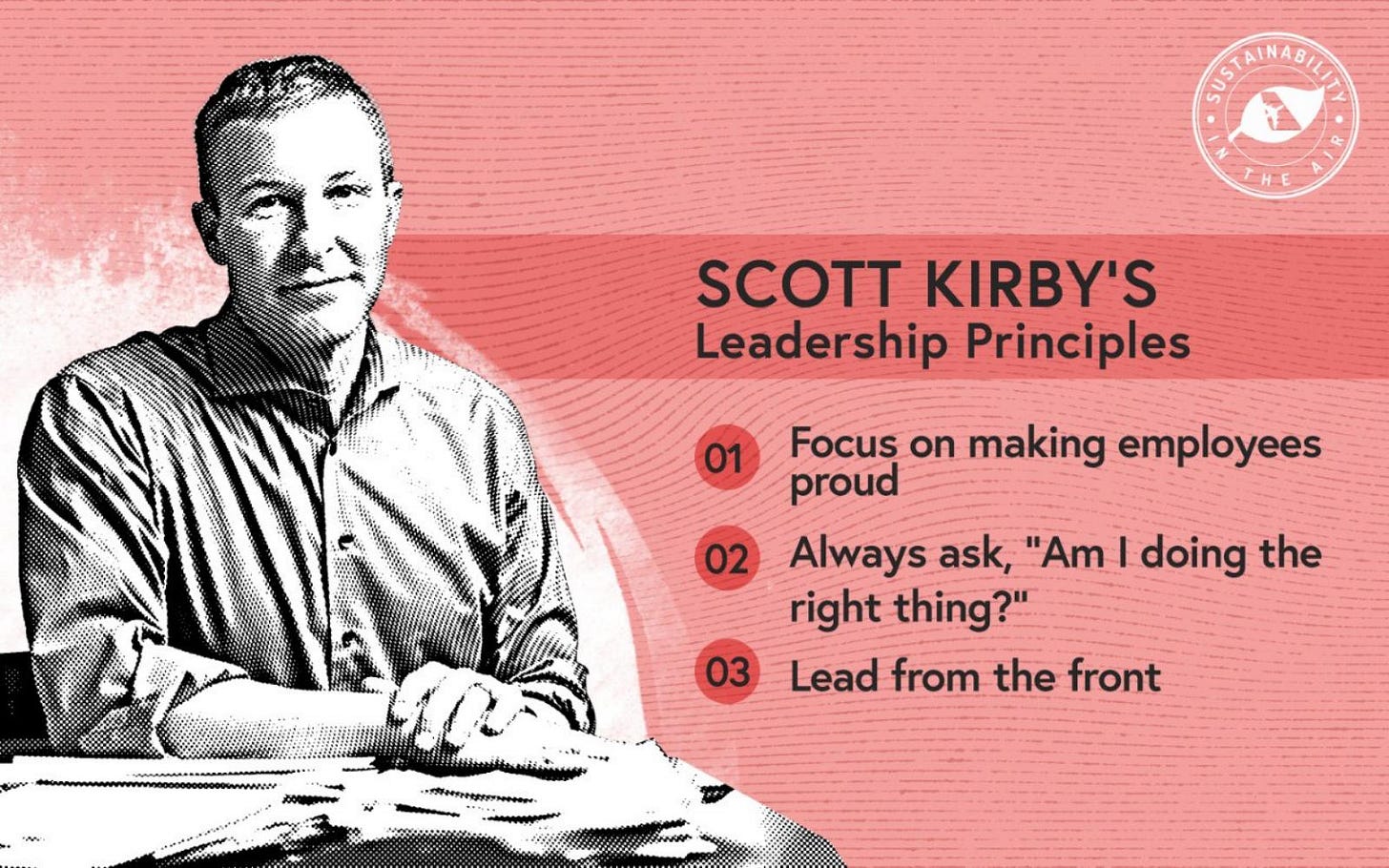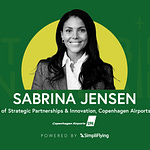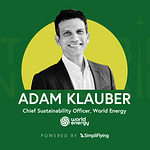Sustainability in the Air is the world’s first podcast dedicated to sustainable aviation. Through in depth conversations with top aviation leaders, we break through the clutter and provide a clear roadmap for a net-zero future.
Scott Kirby does not mince his words. His mantra is clear: “Sustainability is the defining issue for our generation to solve”.
In this episode of our ‘Sustainability in the Air’ podcast, Kirby speaks with SimpliFlying CEO, Shashank Nigam, and explains in detail how United Airlines is the carrier to look up to when it comes to sustainability strategy and investments.
You can listen and subscribe to our podcast on all major podcast platforms or read our deep dive into the episode below.
If you’re rushed for time, you can also directly jump to your topic of interest by referring to these time-stamps:
United’s strategy for net-zero emissions (2:15)
Carbon sequestration and carbon offsets (5:05)
On Sustainable Aviation Fuel (3:23)
United Ventures investment in future technologies (13:25)
United’s partnership with Boom (15: 15)
Advice to CEOs moving into sustainability (26:50)
How will United Airlines get to net-zero emissions?
United Airlines has been a front-runner in exploring and investing in innovations that aim to make the difficult-to-decarbonise aviation industry more sustainable. In fact, in 2021, United became the first airline to fly a passenger flight with 100% Sustainable Aviation Fuel (SAF). The airline’s leadership in the sustainable aviation field can be largely attributed to its CEO’s enthusiastic championing of sustainability as critical to the future of the airline.
United’s plan-of-action to address the sustainability challenge is three-fold:
SAF
Investments in sustainable technologies
Carbon sequestration
These technological solutions, however, are in their very nascent stages and would require a greater adoption into the mainstream for them to bear a significant impact.
Carbon Sequestration instead of Carbon Offsets
United has largely veered away from planting trees to offset their carbon footprint since, as Kirby states, the solution cannot be scaled up to address the problem. He explains that even if every square inch of the planet was utilised to plant trees, it would not be enough.
In effect, the attempt would probably offset less than five months of the total global emissions. “What that means is when everyone is relying on carbon offsets on planting trees as their way to get to net zero, we’ve accounted for five months of mankind’s emissions and not the next 100 years, and we won’t be close”, he says.
In Kirby’s opinion, Carbon Sequestration (CS) is a more promising solution. The idea behind CS is to draw out carbon directly from the atmosphere and pump it into rocks, aiding and accelerating the natural process of carbon absorption. He hopes the technology will become more viable and scalable in the future with the right government policy and support.
“If we put a price on carbon today, if governments put a price on carbon around the world, carbon sequestration would grow on its own. It’s not economical today, but neither were wind and solar 20 years ago. But today, it’s cheaper to produce a megawatt of electricity with wind or solar, because there was government support [and] government credits to build and grow the industry”, he explains.
Is Sustainable Aviation Fuel the answer?
Through United’s Eco-Skies alliance, corporations can donate to companies that are trying to produce and scale SAF. At the moment, SAF is in short supply and is nearly 3-5 times more expensive than jet fuel. But that price is expected to be almost at par with conventional jet fuel as production scales up.
Despite the known benefits of SAF, Kirby explains, its supply remains non-existent. To combat this, United has invested in and helped build SAF companies, allowing them to commit to increasing their SAF to an equivalent of twice the rest of the world’s supply. However, without requisite government support, creating supply and making SAF a mainstream, viable solution is an uphill battle.
“We look for world changing technologies, whether it’s in sustainable aviation fuel, hydrogen powered airplanes, carbon sequestration, supersonic airplanes. They don’t all have to be world changing, but we’re biased to find world changing solutions.”
The vision of United Ventures
The third pillar supporting United’s low-carbon efforts is their attempt to improve their aircraft technology. Partnering with ZeroAvia, Heart, and Archer, United Ventures seeks to bring about electrification of aviation for smaller, short-haul aircrafts. Kirby points out that long distance flights cannot be electrified since the weight of the batteries needed would far exceed the maximum takeoff weight for the airplane! So, bigger planes and long flights have to be powered by jet fuel, at least for the foreseeable future.
On United’s supersonic partnership with Boom
Kirby also shared his insights on United’s venture with Boom to build a supersonic airliner that would run on 100% SAF. It’s worth noting that the Boom Supersonic aircraft is likely to have a high fuel consumption - a single flight on 100% SAF could consume about 80% of Europe’s supply. While Kirby remains optimistic about future supply and refrains from extrapolation, the massive fuel requirement will be quite the challenge to overcome.
Advice to CEOs to make their first moves into sustainability
Kirby takes great pride in United’s efforts and above-and-beyond service. He emphasises how United always tries to do the right thing. Their sustainability efforts, diversity initiatives and the drive to protect customers is well-known. United, Kirby asserts, is the only airline to ever actually run the airflow when passengers were on the ground, even when it cost them $50 million!
Kirby considers making his employees proud of working at the airline as his prime responsibility. He believes that his employees being proud is what contributes to United’s unparalleled hospitality to its customers.
He encourages airline CEOs to be on the path of continuous learning about sustainable initiatives and to lead from the front by fostering innovations and building the industry together.
Our Take: Sustainability and technological transitions
Moving away from carbon-intensive resources is one of the primary goals of sustainability. This is especially difficult for airlines since low-carbon alternatives remain largely non-existent or underdeveloped. The adoption of these technologies would also require changes in ‘socio-technical systems’ composed of ‘actors, networks, institutions, artefacts, infrastructure, markets and practices…’.1 Changes in these systems are called ‘technological transitions’.
Technological Transitions (TTs) are especially important in the aviation sector (or any other system) since they determine if the sustainability goals are being fulfilled. If TTs are steered in the direction of efficient low-carbon technologies through incentives from the government, the newer technology is likely to become viable and competitive with the incumbent techniques.
In the case of SAF and Carbon Sequestration, significant government support would be necessary to get them in the same league as jet fuel. For example, the US government announcing tax credits for SAF seems like a good starting point towards this.
Another reason why airlines find it hard to transition to newer, cleaner technologies is that the ‘socio-technical systems’ are resistant to change. Market-driven mechanisms alone, as Kirby points out, are not enough. The demands placed on governments then become high and strong policy support is required. It is also important to disincentivise existing carbon-laden technologies to ensure that the transformative capacity of newer policies is not diluted.
Ultimately, the road ahead for the aviation industry is fraught with challenges. The presence of strong leaders like Kirby, however, is both cause for hope and excitement about the future of sustainable aviation.
Our Sustainability in the Air podcast is powered by SimpliFlying which has been helping build trust in travel for over a decade.
This season of the podcast is brought to you by CarbonClick, leaders in managing carbon offsetting programs for top global airlines.
Geels, F. W. (2002) ‘Technological transitions as evolutionary reconfiguration processes: a multi-level perspective and a case-study’, Research policy, 31(8), pp. 1257–1274. doi:10.1016/S0048-7333(02)00062-8.














